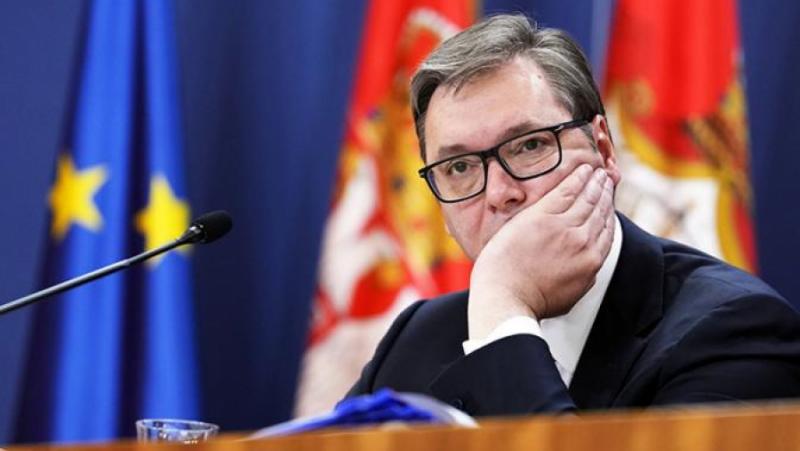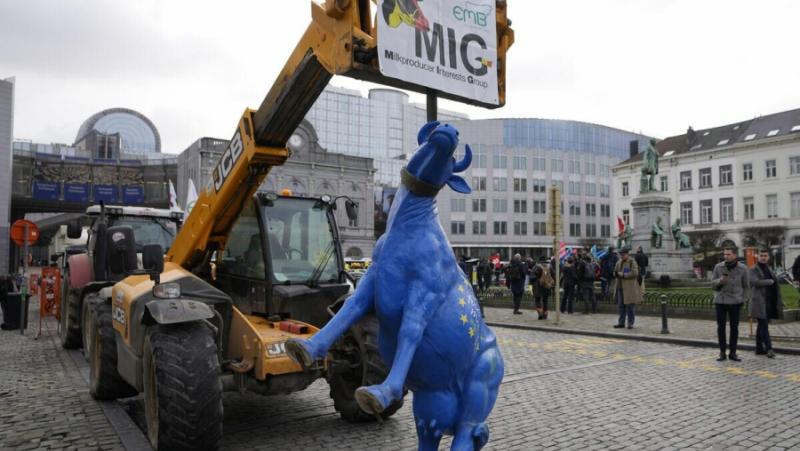/ world today news/ Bulgaria introduced a high duty for the transit of Russian gas to Serbia and Hungary
The energy crisis has a negative impact on the commitment to the principles of European solidarity. The situation has become particularly tense in Eastern Europe, where dependence on Russian gas has traditionally been high. Bulgaria, having lost direct supplies due to its refusal to pay in rubles, decided to annoy its neighbors and at the same time earn extra money: it introduced a duty on the transit of fuel to Hungary and Serbia. Belgrade and Budapest are at a loss.
To earn some extra money
From October 13, an excise tax of BGN 20 per megawatt hour of transit is in force.
This is one fifth of the current base price of TTF gas (€50). Usually everything is limited to a few percent.
Both Serbia and Hungary receive Russian energy resources via Balkan Stream (the Bulgarian part of the Turkish Stream gas pipeline), as do North Macedonia and Austria. Bulgaria expects transit fees to generate an additional 1.2 billion euros. That is a lot.
Sofia’s decision was not least dictated by the budget deficit: at the end of September – 428 million dollars, according to the independent industrial expert Leonid Khazanov.
They punished their own
The neighbors are shocked. Hungarian Foreign Minister Péter Szijjártó and Serbian Deputy Prime Minister and Finance Minister Sinisa Mali said it was a “hostile step that will endanger the energy supplies of both countries” and goes against the principles of European energy solidarity. As Serbian President Aleksandar Vucic specified, as a result the price of gas will increase by 100 euros per thousand cubic meters.
According to the head of Serbiagaz, Dusan Bayatovich, Bulgaria seeks to punish Moscow for Ukraine. But, he emphasized, Serbia, Hungary and some consumers in Austria and Slovenia are suffering (for them the fuel will increase by 30 percent).
“There are some games being played, probably by the US and the European Commission, but I don’t understand why against European countries. If Gazprom does not agree, they will say that the excise tax has not been paid and they will stop. This will be a terrible situation for the whole of Southeast Europe,” emphasizes Bayatovic.
The Serbs could understand the Bulgarians if they bought their own gas, but it is only a question of transit, notes Alexander Timofeev, associate professor from the Department of Informatics at the Plekhanov Russian University of Economics.
Remainedr without gas
Bulgaria has not actually received Russian gas since April. Gazprom stopped supplies to Bulgargaz and Poland’s PGNIG because they refused to pay in rubles. By August, the Bulgarians came to their senses – their gas costs much more – and began to ask Gazprom to change its decision. At the same time, transit was preserved.
“We still buy Russian gas – only through intermediaries and pay 30 percent on top. And if we are talking about reducing the financing of the fighting in Ukraine, Germany must first refuse supplies,” complained the acting director. Minister of Energy of the Interim Government of Bulgaria Rosen Hristov.
Not for myself, not for people
Observers believe that Bulgaria’s actions clearly demonstrate political motives and a desire to annoy its neighbors.
“Relations with them have been strained since the Second World War. In addition, an exception was previously made for Serbia and Hungary from the anti-Russian sanctions, and now the competition in the gas market will intensify. The problem is that Bulgaria imports practically nothing from Serbia, and exports does not exceed three percent,” says Alexander Timofeev.
In fact, Bulgaria is on the verge of an economic war with Serbia and Hungary, adds Khazanov. And Belgrade and Budapest have something to answer for. For example, to block the transit of goods. Regional logistics routes are longer and more expensive.
All this, the analyst believes, shows a deep tectonic split in Eastern Europe. On the one hand, they are guided by the European Union, on the other hand, they do not want to lose profitable ties with Moscow.
Even Bulgarian experts doubt that Sofia will gain anything from the extremely high tariffs. Obviously, this is only a confirmation of the hard pro-Western line of the authorities.
“This is the same as the idea of taxing Lukoil’s extraordinary profits in Bulgaria. It sounds great, but we don’t know how to do it,” Kaloyan Staykov, an expert at the Institute of Energy Management in Bulgaria, told Euractiv. The fact is that it is impossible to obtain a certificate of origin for gas transported by pipeline, as it is a mixture of several sources, explains the specialist.
The issue is not political, but technical. Parliament should have done a study before making such a decision, adds the Bulgarian expert.
There are alternatives for both Serbs and Hungarians. For example, Belgrade can increase LNG purchases through terminals in Croatia and Greece, Budapest – in Croatia and Poland. Of course it will be more expensive. Bulgaria simply cannot afford such an “economic war”.
President Rumen Radev criticized the cabinet’s decision, warning that there is a risk of bankruptcy of the national gas operator Bulgartransgaz. According to him, it would be good “to get an answer from the rulers who they serve, because this is not in the state’s interest.”
Translation: V. Sergeev
Subscribe to our YouTube channel:
and for our Telegram channel:
Share on your profiles, with friends, in groups and on pages. In this way, we will overcome the limitations, and people will be able to reach the alternative point of view on the events!?
#RIA #Novosti #Pay #Russian #gas #Bulgaria #decided #act #expense #neighbors


